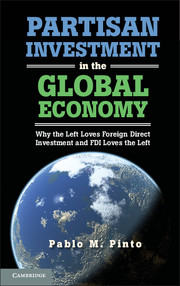 Partisan Investment in the Global Economy
Partisan Investment in the Global Economy Book contents
- Frontmatter
- Contents
- List of Figures
- List of Tables
- Acknowledgments
- 1 Domestic Coalitions and the Political Economy of Foreign Direct Investment
- 2 A Political Economy Model of Foreign Direct Investment
- 3 Tying Hands or Exchanging Hostages: Partisan Governments, Commitment, and FDI Performance
- 4 Partisan Governments and Foreign Direct Investment: Results from Cross-Country Statistical Analyses
- 5 Labor and Business Influence, Investment Regimes, and Foreign Investment in Argentina
- 6 Business Influence, Politics, and Foreign Direct Investment in South Korea
- 7 Conclusion
- Bibliography
- Index
6 - Business Influence, Politics, and Foreign Direct Investment in South Korea
Published online by Cambridge University Press: 05 March 2013
- Frontmatter
- Contents
- List of Figures
- List of Tables
- Acknowledgments
- 1 Domestic Coalitions and the Political Economy of Foreign Direct Investment
- 2 A Political Economy Model of Foreign Direct Investment
- 3 Tying Hands or Exchanging Hostages: Partisan Governments, Commitment, and FDI Performance
- 4 Partisan Governments and Foreign Direct Investment: Results from Cross-Country Statistical Analyses
- 5 Labor and Business Influence, Investment Regimes, and Foreign Investment in Argentina
- 6 Business Influence, Politics, and Foreign Direct Investment in South Korea
- 7 Conclusion
- Bibliography
- Index
Summary
Introduction
The statistical evidence presented in Chapter 4, albeit tentative, suggests that the predictions from the partisan theory of FDI are plausible: when prolabor/left-leaning governments are in power, FDI inflows increase more often than not. In the longitudinal analysis presented in the previous chapter, I discuss the evolution of investment regimes and FDI performance in Argentina in the post-war era. The evidence from the Argentine case provides additional support to the partisan hypothesis by exploring changing patters of the political influence of labor and business: pro-labor and pro-capital coalitions that have alternated in power since the 1930s have treated foreign capital differently. In the Argentine case, I focus on the varying influence of organized labor, which results from institutional and other political conditions, including movements to and from democratic rule as well as partisan cycles. From Juan Perón, through the different military regimes, Radical and Desarrollista governments, to Carlos Menem and Néstor Kirchner, we observe that incumbents received varying degrees of support from workers, industrialists, and agricultural producers. Further, these governments assumed very different pro- or anti-labor stances, which in turn seem to reflect the preferences of their core supporters. As discussed in the previous chapter, changes in labor influence or in the pro-labor or pro-business orientation of the ruling coalition seem to have had an effect on the type of investment regimes adopted and on the degree of openness to FDI.
- Type
- Chapter
- Information
- Partisan Investment in the Global EconomyWhy the Left Loves Foreign Direct Investment and FDI Loves the Left, pp. 205 - 247Publisher: Cambridge University PressPrint publication year: 2013
